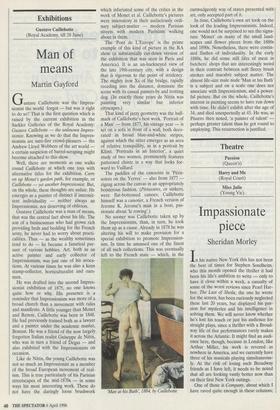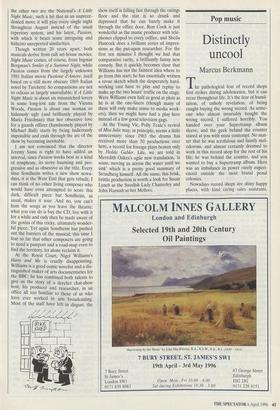Theatre
Passion (Queen's)
Harry and Me (Royal Court) Miss Julie (Young Vic)
Impassionate piece
Sheridan Morley
In his native New York this has not been the best of times for Stephen Sondheim, who this month opened the thriller it had been his life's ambition to write — only to have it close within a week, a casualty of some of the worst reviews since Pearl Har- bor. The Last of Sheila, the one he wrote for the screen, has been curiously neglected these last 20 years, but displayed his pas- sion for mysteries and his intelligence in solving them. We will never know whether he's lost his touch or just his audience for straight plays, since a thriller with a Broad- way life of five performances rarely makes it across the Atlantic. It might find an audi- ence here, though, because in London, like Arthur Miller, his work is revered as nowhere in America, and we currently have three of his musicals playing simultaneous- ly. At the risk of losing such Broadway friends as I have left, it needs to be noted that all are looking vastly better now than on their first New York outings.
One of those is Company, about which I have raved quite enough in these columns; the other two are the National's A Little Night Music, such a hit that in an unprece- dented move it will play every single night throughout August instead of the usual repertory system, and his latest, Passion, with which it bears some intriguing and hitherto unreported similarities.
Though written 20 years apart, both musicals derive from cult art-house movies: Night Music comes, of course, from Ingmar Bergman's Smiles of a Summer Night, while Passion comes from the largely unknown 1981 Italian movie Passione d'Amore, itself based on a still more obscure 1869 Italian novel by Tarchetti. So comparisons are not so odious as largely unavailable; if A Little Night Music is about six mismatched lovers in some long-lost tale from the Vienna Woods, Passion is about one woman so hideously ugly (and brilliantly played by Maria Friedman) that her obsessive love for a guards officer (handsomely played by Michael Ball) starts by being ludicrously impossible and ends through the arc of the show by becoming inevitable.
I am not convinced that the director Jeremy Sams is right to have added an interval, since Passion works best as a kind of symphony, its score haunting and pro- gressive and as obsessive as the title. Every time Sondheim writes a new show nowa- days, it is the West End that gets rebuilt; I can think of no other living composer who would have even attempted to score this dark, difficult piece but Sondheim, as usual, makes it soar. And no, you can't hum the songs as you leave the theatre; what you can do is buy the CD, live with it for a while and only then be made aware of the genius of this tricky, ultimately wonder- ful piece. Yet again Sondheim has pushed out the barriers of the musical; this time I fear so far that other composers are going to need a passport and a road-map even to find the territory, let alone reclaim it.
At the Royal Court, Nigel Williams's Harry and Me is cruelly disappointing. Williams is a good comic novelist and a dis- tinguished maker of arts documentaries for the BBC; he has combined both talents to give us the story of a derelict chat-show host, his producer and researcher, in an office all too familiar to those of us who have ever worked in arts broadcasting. Most of the staff have left in disgust, the show itself is falling fast through the ratings floor and the star is so drunk and depressed that he can barely make it through the office door. Ron Cook is just wonderful as the manic producer with tele- phones clipped to every orifice, and Sheila Hancock does a brilliant series of impres- sions as the put-upon researcher. For the first ten minutes I thought we had that comparative rarity, a brilliantly funny new comedy. But it quickly becomes clear that Williams has not the faintest idea where to go from this start; he has essentially written a revue sketch which the desperately hard- working cast have to play and replay to make up the two hours' traffic on the stage. Were Williams even half as good at plots as he is at the one-liners (though many of these will only make sense to media work- ers), then we might have had a play here instead of a few good television gags. At the Young Vic, Polly Teale's revival of Miss Julie may, in principle, seems a little unnecessary: since 1965 the drama has received more than 50 productions over here, a record for foreign plays beaten only by Hedda Gabler. Life, we are told in Meredith Oakes's agile new translation, 'is scum, moving us across the water until we sink' which is a pretty good summary of Strindberg himself. All the same, this brisk, brittle production is worth a look for Susan Lynch as the Swedish Lady Chatterley and John Hannah as her Mellors.



























































 Previous page
Previous page